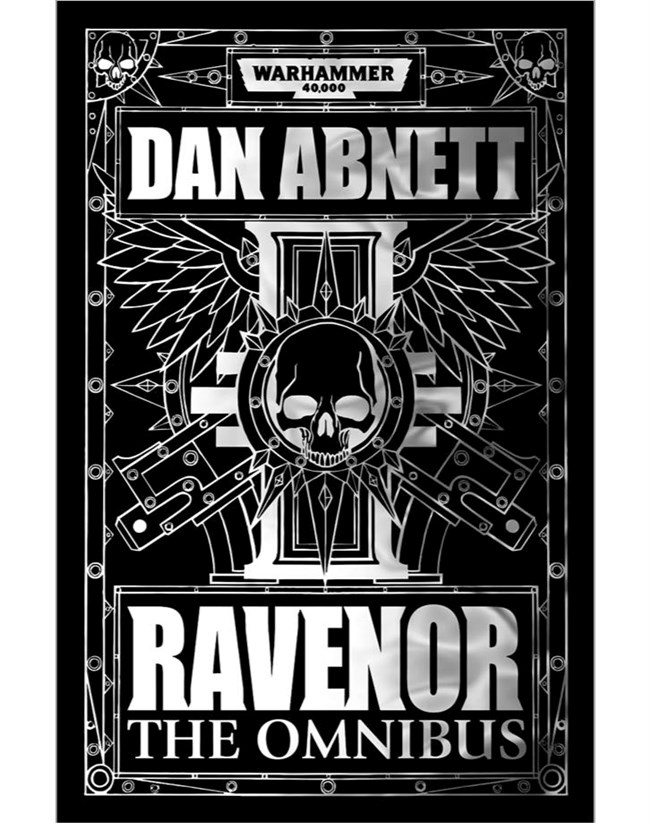Once again I have decided to explore more of what is apparently called "The Daniverse" within the much larger Warhammer 40,000 universe with the Ravenor omnibus, which contains the novels Ravenor, Ravenor Returned, and Ravenor Rogue. Much like the Eisenhorn trilogy this book follows the adventures of Gideon Ravenor, and Imperial Inquisitor and psyker, as he roots out the enemies of the Imperium from within. (And if you didn't know already, Ravenor is Eisenhorn's apprentice who has graduated to become an Inquisitor in his own right.) While these books were enjoyable, as pretty much anything penned by Dan Abnett is, I had more difficulty with these than I did with Eisenhorn and I feel like they're not as well put together as the Eisenhorn novels. Definitely still worth a read, especially since the next omnibus is apparently Ravenor vs. Eisenhorn and I definitely plan on reading that in the future. Yes, it's good, but it's not my favorite thing to come from Dan's desk.
What I liked about this series of novels, and this is what I liked about the Eisenhorn books too, was that you got to see the Imperium operating from the inside. Most 40k novels occur when there's, you know, fighting going on, and normal life has been disrupted on whatever ball of dirt's being attacked. In the Inquisition novels they're not facing down an army of orks or a Tau battlegroup; instead, they're taking on Chaos cults and xenos sympathizers who threaten to weaken the Imperium from within. So you get to see how the Imperium works and what daily life for most people is like. Granted, life is still pretty bad when you're not getting eaten by Tyranids or something, but it's a change of pace.
Unlike the Eisenhorn books, though, I feel like these books require an understanding of some of the ins and outs of the 40k universe before reading. Eisenhorn did a great job of introducing people to concepts such as daemons, blanks, and rogue traders but in Ravenor you're expected to already know what those are without a lot of explanation. So if you're new to the 40k universe and looking to get yourself oriented, I'd recommend at least waiting on these books until you've gotten your feet wet. If you're an experienced vet, though, I think you'd enjoy these novels.
I think the main problem with this is that, according to Dan's introduction, these books were not initially meant to be a trilogy. Yes, they tie together as a trilogy in the end, but Abnett had originally envisioned the Ravenor series much like Gaunt's Ghosts: a series of ongoing adventures following our characters across space. The second two books definitely feel much more connected plot-wise to each other than they do to the first book, especially with the major plot of the birth of the deamon Slyte who threatens to destroy an entire sub-sector and seriously weaken the Imperium. It definitely works, but I feel like the first book kind of stands on its own. Much like how A New Hope kind of stands on its own from Empire Strikes Back and Return of the Jedi. Still connected, but the last two more connected than the first two.
The other thing I noticed was a tendency for the books to have a fairly slow investigative pace and then everything sort of suddenly come together at the last minute in a huge showdown. I think Abnett was trying to capture sort of the essence of police fiction in that regard, where there's a lot of time spent investigating the case and slowly putting all the pieces together, followed by a sudden burst of action at the end where the case gets busted wide open. It's certainly a legitimate literary approach but I get the feeling that it isn't Abnett's strong suit. Definitely a thumbs-up for trying something new and if the next omnibus is like this I hope that his skill develops and he gets better.
Despite the issues I had with this book, I think it was at least enjoyable. If you're an old hand at the 40k universe you'd definitely want to give this book a go, especially if you like a lot of Dan Abnett's other stuff. As with the Eisenhorn novels, it was a refreshing change to look at planets that weren't being completely destroyed by invading armies and see how the Imperium works on the inside. I don't think this is a book for newbies, though, and you should probably know about a number of things before jumping into this series.
- Kalpar


No comments:
Post a Comment